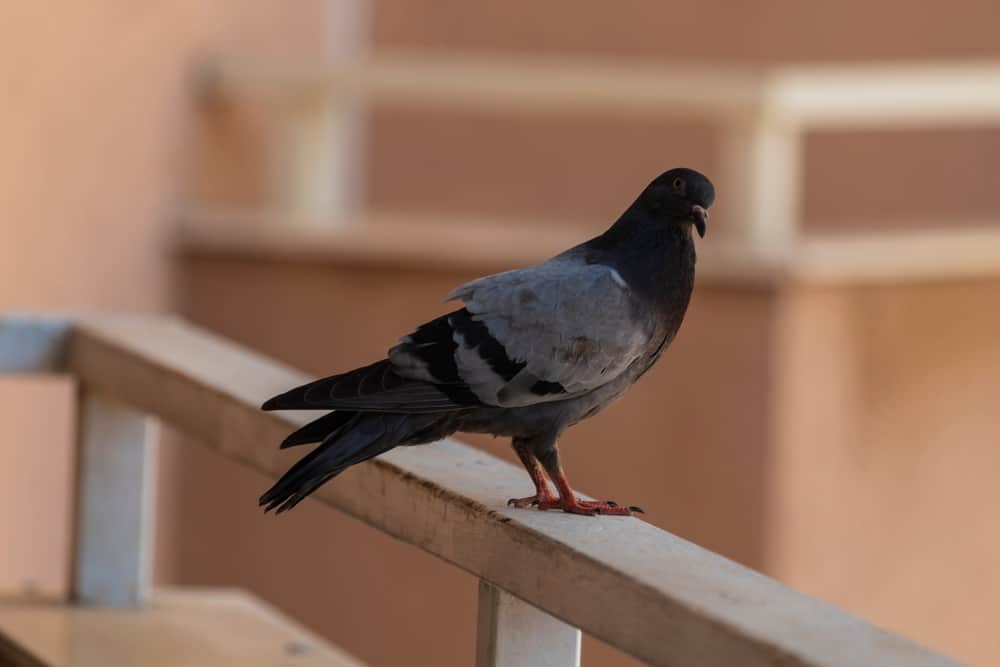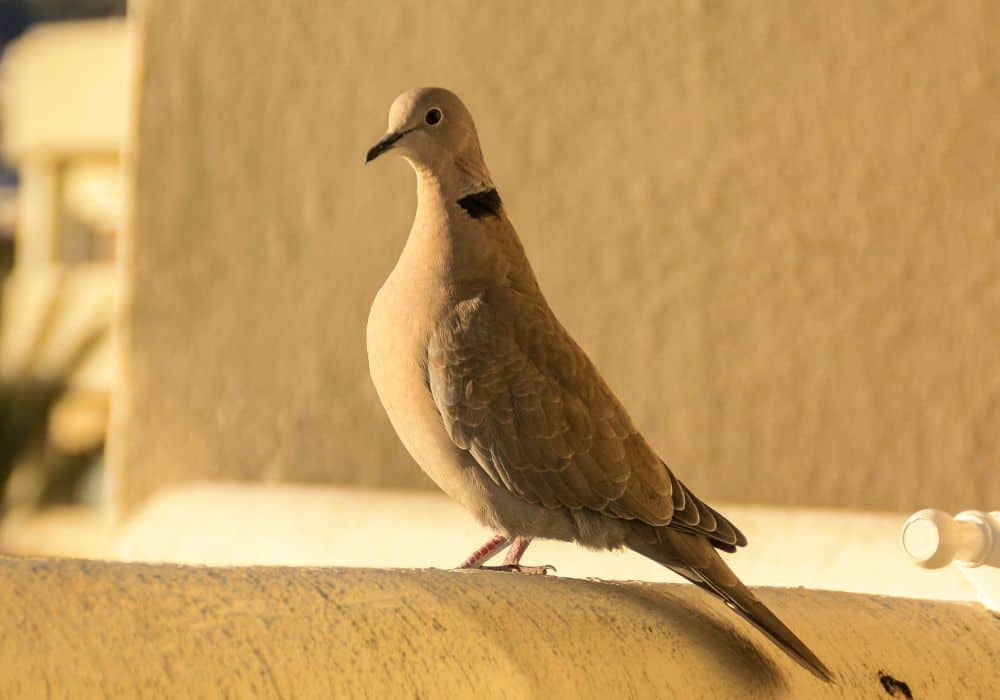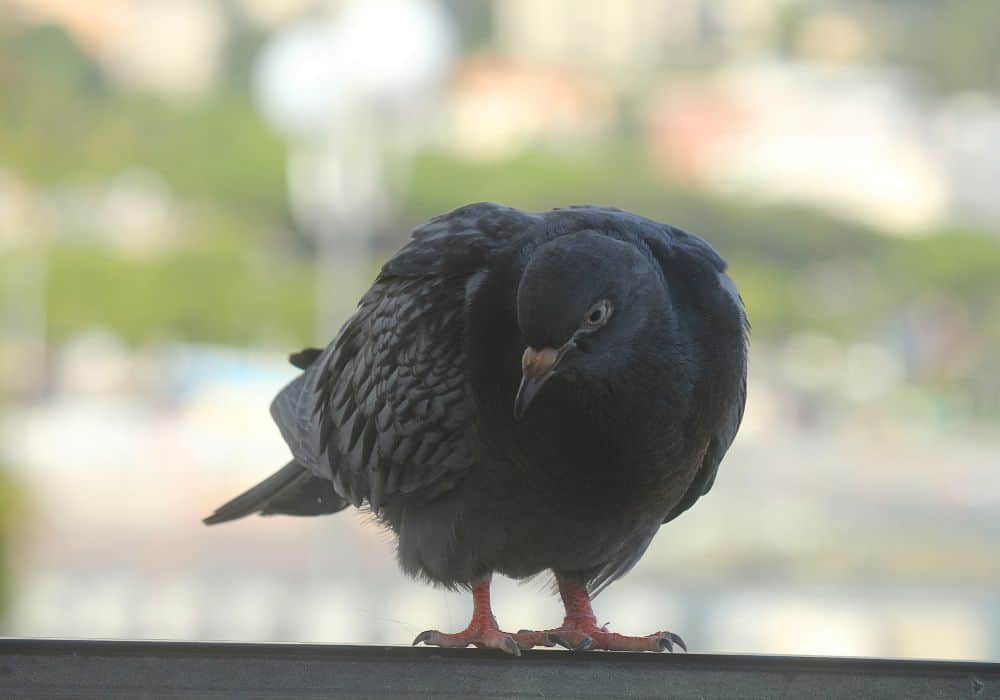Pigeons aren’t exactly the most popular birds. In fact, they can be total pests, leaving excrement in the most awkward of places. If you have a balcony in your apartment, then you probably don’t want to deal with a nest of flying rats in your area.
Getting rid of pigeons on your balcony is something that can be a royal pain in the behind. If you want to have an easier time, the best thing you can do is prevent pigeons from roosting near your home at all. But, how do you do that? It’s time to discuss it.
Why do pigeons like my balcony and roof so much?
Prior to pigeons becoming an urban birds, their natural habitat was found on ledges of tall cliffs. Buildings, particularly balconies and rooftops, tend to have similar structures to what they are used to in the wild.
Pigeons associate tall heights with protection from predators, better views, and safety from the elements. You don’t need to offer them food or water for them to find your balcony to be a new home.
How do you prevent pigeons from returning to your balcony?
It takes strategy. These tips can help you prevent pigeons (and owls and other pests) from perching too close to your home.
1. Get Pest Control
If you find that your area is already swamped with pigeons and nests, you might want to get professionals involved. Once pigeons fall for a place, they can be hard to remove. Moreover, their nests can contain fleas and similar parasites.
Call a professional to remove nests and nesting materials from your roof and balconies. Do not try to remove pigeon nests on your own, since this will only make the birds abandon the nest and set up a new nest elsewhere.
Professional pest control is often the best choice if your building is very large and has multiple balconies.
2. Install Roof Spikes
In order for pigeons to want to stay in an area, they are going to need to perch somewhere. Keeping pigeons away can mean installing bird spikes that prevent them from staying near your roof or nesting in your balconies.
It’s a physical barrier that will reduce the interest they have in your home. Well-installed spikes will usually keep them away without any other additional help needed. (Don’t worry, they don’t harm the birds.)
3. Use Faux Predators
If you don’t want to add spikes or a similarly ugly device to your balcony, don’t panic. You can also use pigeons’ natural fear of predators to keep them at bay. A plastic owl or fake hawk placed on a perch outside your balcony will keep most pigeons away.
Not sure you want to have a faux owl on your balcony? You can also use a rubber snake or just let your stuffed animals hang out near your balcony. Pigeons are not fans of dogs or cats, so realistic stuffies will often do the trick.
PRO TIP – If you have cats, make sure to add a fence or netting to prevent them from jumping off your balcony. Your pets need safety more than you need to keep pigeons away from your balcony.
4. Use Bird Netting
If you keep having pigeons show up on your balcony, consider placing a net, wire mesh, or a full-size fence around your roof and balcony. There are few things that will make as big of a difference as a physical barrier.
This will keep out pigeons as far as their physical presence goes. However, they can still sit on top of the net and poop. Getting a barrier that’s a little more involved can help.
5. Use Pigeon Repellent
Like most other animals, there are certain smells and chemicals that can repel pigeons. They actually sell bird repellent and pigeon repellent gel at hardware stores these days. If you’re looking for a store-bought option, this is a great way to go.
Pigeons are also said to hate the smell of vinegar and spices like pepper. Planting chili peppers near your home or having a cinnamon plant can dissuade pigeons from coming back to your place.
For an easy DIY fix, you can create your own scare pigeons from old CDs tied to a stick near your balcony. Or, you can mix hot chili pepper with vinegar, and spray that around your rooftop area.
PRO TIP – Vinegar doesn’t just dispel pigeons. Most major pests, including fleas and roaches, dislike the smell of vinegar. Using this will often cut down your pest problems significantly, especially if you have been struggling to get rid of multiple insects.
6. Use Visual Repellents
In a lot of ways, pigeons really aren’t too different from most other birds. They generally do not want to be around things that look like they are moving. It’s a sign of a potential predator to pigeons. visual repellents are fairly easy to make, even if they aren’t totally predator-style.
An easy way to keep pigeons away is to use reflective tape around the perimeter of the balcony. If you are okay with it, you can also tie foil balloons to your balcony’s railing. Anything reflective tends to work well with this.
7. Keep Your Area Clean
Birds will often try to find places that have dirty gutters or open crannies to nest in. This means that the area near your attic, the nooks near the underside of your roof, and any areas with too many leaves can turn into a pigeon attraction.
Sealing areas off with silicon caulk, gutter shields, or even just netting can help you make sure that your pigeon problem goes away pretty soon. On a similar note, you should avoid keeping food sources near your home.
It’s easy to forget that pigeons are scavenger birds. If they see food waste on your balcony, they will make a point of returning for more food. Removing food and sources of nesting material is more effective than most visual deterrents, just so you know.
PRO TIP – Removing debris from your yard can also help keep birds of all types away from your building.
8. Use Noise
If you don’t mind spoiling the peace, you might want to look into using a noise deterrent. Pigeons, like all other animals, keep an ear out for the sounds of predators. Some companies actually make devices that imitate predator sounds.
These can be somewhat effective, but the truth is that this option is often best used in areas you won’t want to hang out in. After all, who really likes to deal with going outside, only to hear a bunch of growls and squawks every five minutes?
In most cases, this solution is one that can irritate neighbors. Unless you have very understanding neighbors, we suggest this as a last resort.
9. Shock Them Away
If you struggle with having pigeons that roost on a particular ledge or column, you can also ask someone to install a shock deterrent around your area. This will send a low-grade shock to the pigeon’s feet when they try to land in your area.
Shock deterrents have several issues, including a potential fire hazard and potential cruelty to pigeons. If you have cats, we do not suggest getting these since they can harm the paws of your furry friends.
10. Add Predators
If a fake owl doesn’t work, don’t worry, there are other options that will dissuade your local pigeon population from making your place home. If you have the money do to so, you can actually rent out raptors (hawks, owls) to take care of your pigeon problem.
Of course, there’s also a chance that you may have an animal or two that already views pigeons as dinner. If you have cats or dogs, then you already may have a way to deter pigeons from visiting. Simply let your pet on the balcony and keep them secured in place.
Most pigeons are fairly easy to spook. They don’t want to deal with snakes, dogs, or raptors because they are not exactly the best at defending themselves. Even seeing a poodle wagging his tail will send most pigeons flying off into the sunset for good.

In conclusion…
If you are sick and tired of having to scrape away pigeon poop, don’t panic. You have quite a few ways to get pigeons away from your home. It’s all about finding the right choice (or choices) for your budget, needs, and current setup.
With all this said, pigeons rarely ever actually cause disease or major damage to your property. It’s not like they are roaches or rats. They actually are just birds and at times, can also help cut down on other pests that are a bit worse.
In most cases, removing their source of food will be enough to make them leave. Of course, if you are worried about something more substantial, there are options there, too.


